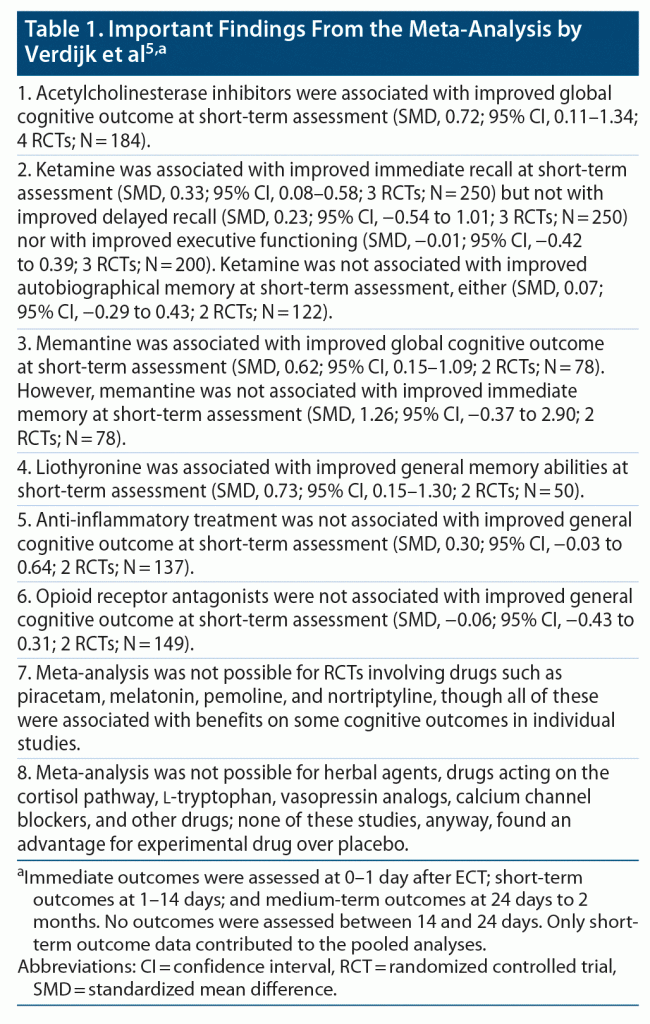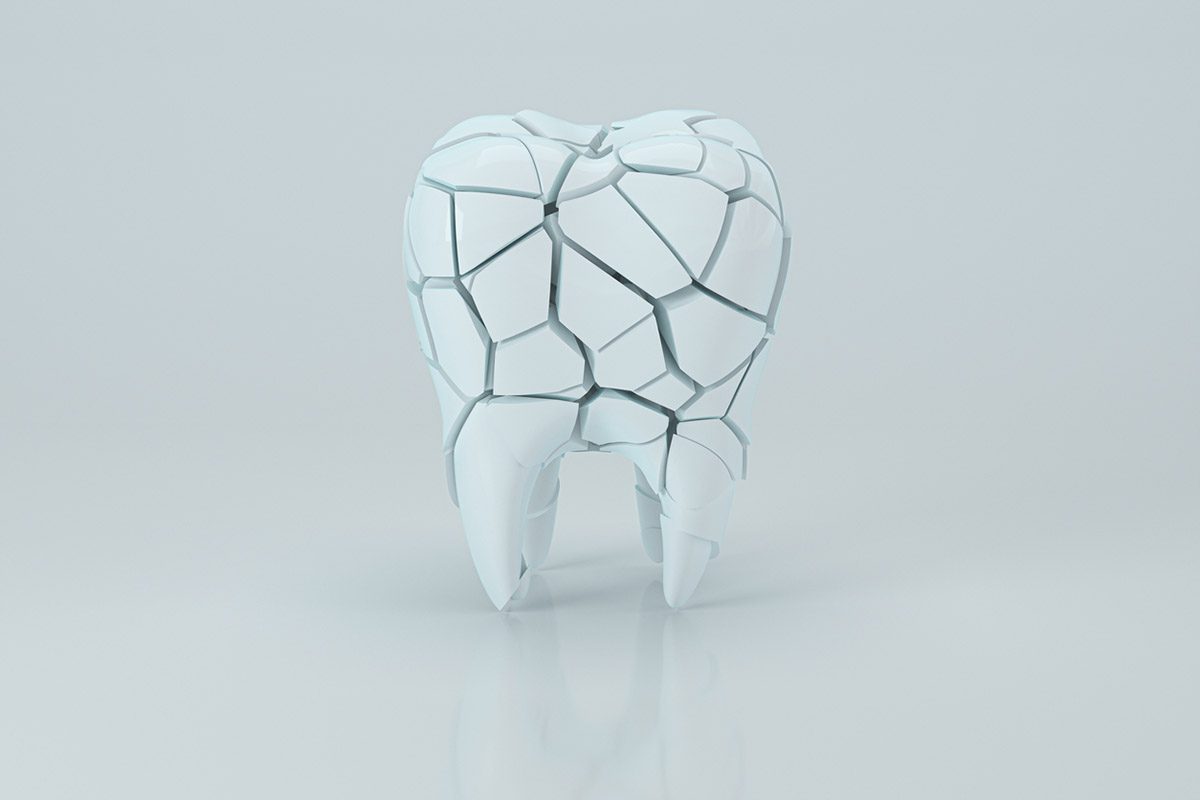ABSTRACT
The cognitive adverse effects (AEs) of electroconvulsive therapy (ECT) limit the wider use of the treatment. These AEs can be attenuated by changing the way ECT is administered; however, such changes may reduce the response rate, the speed of response, or both. A recent systematic review and meta-analysis identified more than a dozen pharmacologic interventions in 26 randomized controlled trials (RCTs) that sought to reduce ECT-induced cognitive AEs. Because of large differences across RCTs, only a few outcomes for a few interventions could be pooled in meta-analysis, and most pooled analyses included only 2–3 RCTs. Important findings were that acetylcholinesterase inhibitors, ketamine, memantine, and liothyronine were associated with improved global cognitive functioning at 1–14 days post-ECT. Anti-inflammatory treatments and opioid receptor antagonists were not associated with improvement in general cognitive outcome at 1–14 days post-ECT. Meta-analysis was not possible for the remaining interventions, including piracetam, melatonin, pemoline, nortriptyline, herbal agents, drugs acting on the cortisol pathway, opioid receptor antagonists, l-tryptophan, vasopressin analogs, calcium channel blockers, and others; in individual RCTs, some of these interventions attenuated some cognitive measures as some time points after ECT. Regrettably, none of the RCTs examined clinically meaningful outcomes such as subjective cognitive impairment, impairments in daily life, and persistent autobiographical memory deficits. Future research should study such clinically meaningful outcomes (rather than laboratory tests), using pharmacologic interventions, perhaps in combination, for ECT procedures that are associated with higher cognitive AE burden. A risk is that whatever attenuates ECT-induced cognitive AEs may also attenuate ECT-related therapeutic benefits.
J Clin Psychiatry 2022;83(5):22f14668
To cite: Andrade C. Reconsideration of the benefits of pharmacological interventions for the attenuation of the cognitive adverse effects of electroconvulsive therapy. J Clin Psychiatry. 2022;83(5):22f14668.
To share: https://doi.org/10.4088/JCP.22f14668
© 2022 Physicians Postgraduate Press, Inc.
Electroconvulsive therapy (ECT) is the oldest and perhaps the most effective treatment for major mental illness, demonstrating benefits even in patients who fail pharmacotherapy trials. The wider use of ECT is limited by many factors. There is stigma associated with the treatment due to distorted depictions in the mass media. There are negative attitudes toward the treatment because of the application of electricity to the head and the need for the induction of a seizure for therapeutic benefit. And, there are concerns about the cognitive adverse effects of the treatment.1
Successful strategies to reduce the cognitive adverse effects of ECT include switching from sinusoidal wave to brief-pulse and ultrabrief-pulse ECT, from bilateral to bifrontal and right unilateral ECT, from high dose to low dose ECT, and from thrice weekly to twice weekly ECT. Some of these strategies reduce the rate of response to the treatment and some slow the speed of response.2
Many pharmacologic interventions have been studied in animal models and in clinical trials with a view to reduce ECT-induced cognitive deficits.3,4 The clinical data were quantitatively examined in a recent meta-analysis.5 The present article examines the findings of the meta-analysis and considers the challenges that researchers face in the field.
The Meta-Analysis by Verdijk et al5
Verdijk et al5 described a systematic review and meta-analysis of parallel-group randomized controlled trials (RCTs) of pharmacologic interventions that sought to diminish the cognitive adverse effects of brief-pulse ECT. These authors identified 26 RCTs (pooled N = 1,387) of more than a dozen interventions, conducted in 14 different countries between 1978 and 2020. Eleven of the RCTs had been conducted in Iran and 4, each, in the United States and China.
The median age of the patients in the studies was 41 years; men and women were approximately equally represented. Two-thirds of the studies had been specifically conducted in depressed samples; in the remainder, mixed samples were recruited or samples were restricted to mania or schizophrenia. About 58% of the studies employed bilateral ECT and 22%, right unilateral ECT; in the rest, electrode placement was mixed or not specified.
Synthesis of data proved challenging for the authors. This is understandable because there were too many pharmacologic interventions, too few RCTs per intervention, too many different kinds of cognitive assessment, and too many different time points at which the assessments were made. As a result, there were only 2–3 RCTs per analysis in most of the (few) situations in which meta-analysis was actually possible; and sample sizes in these pooled analyses were mostly small to very small. Publication bias could not be assessed in any analysis for the same reason: there were too few trials.
Important findings from the meta-analysis, taken from the main paper and from the supplementary data, are presented in Table 1; results from individual studies (where no meta-analysis was possible) are not presented. In summary, acetylcholinesterase inhibitors, ketamine, memantine, and liothyronine were associated with medium effect size improvements at 1–14 days post-ECT in domains such as immediate recall, general memory ability, and global cognitive functioning. Anti-inflammatory treatments and opioid receptor antagonists were not associated with improvement in general cognitive outcome at 1–14 days post-ECT. Meta-analysis was not possible for RCTs involving drugs such as piracetam, melatonin, pemoline, and nortriptyline, though all of these were associated with benefits on some cognitive outcomes. Meta-analysis was also not possible for herbal agents, drugs acting on the cortisol pathway, opioid receptor antagonists, l-tryptophan, vasopressin analogs, calcium channel blockers, and other drugs; none of these drugs outperformed placebo in their respective RCTs.
Limitations of the Research in the Field
After having received ECT, many patients complain of memory and other cognitive impairments. However, it is likely that at least some of such impairment is due partly to everyday absent-mindedness and forgetfulness and partly to the illness for which ECT was prescribed.1 In this context, it would have been helpful to see meta-analysis of the findings of RCTs that examined whether or not pharmacologic interventions attenuated subjective memory and other cognitive complaints after ECT. Unfortunately, not a single RCT examined such patient-reported outcome measures.
Next, the RCTs variously reported significant benefit with pharmacologic intervention for outcomes such as immediate recall, delayed recall, working memory, and other cognitive functions. These cognitive functions had been evaluated using neuropsychological tests. Neuropsychological tests are fine-grain assessments. It is not clear to what extent impairments in such laboratory assessments translate into cognitive impairments in daily life. Unfortunately, not a single RCT examined everyday functional outcomes.
Finally, persistent autobiographical memory impairment is arguably the most distressing cognitive adverse effect ascribed to ECT; again, none of the RCTs in the meta-analysis examined whether pharmacologic intervention improved autobiographical memory outcomes at, for example, 1 month post-ECT or later.
Conceptual Issues for the Field
Whatever research is conducted in the field will have to be conducted in the context of bilateral ECT rather than unilateral ECT, high dose ECT rather than low dose ECT, and thrice weekly ECT rather than twice weekly ECT. This is because unilateral ECT, low dose ECT, and twice weekly ECT are all associated with a lower burden of cognitive adverse effects1; there is not much point in trying to attenuate ECT-induced cognitive deficits when the deficits may be of low clinical significance.
Because the cognitive burden of ECT depends on how ECT was administered, findings related to pharmacologic interventions must only be generalized to the method by which ECT was administered. So, for example, if a pharmacologic intervention attenuates impairment in a cognitive domain after right unilateral or twice weekly ECT, there is no assurance that the intervention will attenuate impairment in that domain after bilateral or thrice weekly ECT. Likewise, generalization of study findings will be diagnosis-specific because, for example, patients with depression and schizophrenia have different patterns of baseline cognitive impairment and, because of differences in etiopathogenetic mechanisms, these patients may respond differently to pharmacologic interventions meant to attenuate ECT-induced cognitive disturbance. Because of these matters, meta-analysis, ideally, should not pool studies when clinical diagnoses and ECT procedures vary across studies.
Most psychopharmacologic agents, especially the newer drugs, have specific neurochemical actions. In contrast, ECT has a multitude of actions on the brain; these include a wide range of actions on neurotransmitters and neurohormones, resulting in a wide range of effects, from electrophysiological changes to stimulation of neuroplasticity.6–8 It is very unlikely that a single action from among all of these will be responsible for the cognitive adverse effects of ECT. As a result, pharmacologic interventions that target a single mechanism may not bring about meaningful benefit even if the mechanism addressed is relevant to the cognitive adverse effect. In other words, pharmacologic combinations may be more likely to yield clinical benefits than pharmacologic monotherapies.
This straightaway leads to a problem. What if pharmacologic interventions, especially in combination, interfere with the mechanism of therapeutic benefit in addition to interfering with the mechanism of cognitive adverse effects? Consider, for example, that prolonged seizures are associated with greater ECT-induced cognitive impairment; however, a well-generalized seizure is essential for the efficacy of ECT.1,2 So, any intervention that interferes with the seizure might attenuate ECT-induced cognitive adverse effects as well as ECT-related therapeutic effects. Similarly, ECT-induced neuroplasticity has been associated with both ECT-related therapeutic benefit and ECT-related cognitive impairment9,10; so, targeting glucocorticoid mechanisms with a view to disrupting the neuroplasticity effects of the treatment could reduce both cognitive adverse effects and antidepressant benefits.
Food for Thought
One wonders whether greater efficacy of a treatment is inextricably tied to greater adverse effect burden through a larger number of biological actions. This is evident with dual acting vs single action antidepressant comparisons and with clozapine vs other antipsychotic comparisons. This perhaps also applies to ECT vs pharmacotherapy and to more effective vs less effective forms of ECT comparisons.
This should not discourage further research on the pharmacologic attenuation of ECT-induced cognitive deficits. However, future studies should address meaningful outcomes; specifically, subjective memory impairments, cognitive impairments in everyday life, and autobiographical memory impairments, if any, that remain evident 1 month and longer after the end of the ECT course. Future studies should also focus on the more effective forms of ECT that have been more associated with cognitive adverse effects.
Published online: October 3, 2022.
 Each month in his online column, Dr Andrade considers theoretical and practical ideas in clinical psychopharmacology with a view to update the knowledge and skills of medical practitioners who treat patients with psychiatric conditions.
Each month in his online column, Dr Andrade considers theoretical and practical ideas in clinical psychopharmacology with a view to update the knowledge and skills of medical practitioners who treat patients with psychiatric conditions.
Department of Clinical Psychopharmacology and Neurotoxicology, National Institute of Mental Health and Neurosciences, Bangalore, India ([email protected]).
References (10)

- Andrade C, Arumugham SS, Thirthalli J. Adverse effects of electroconvulsive therapy. Psychiatr Clin North Am. 2016;39(3):513–530. PubMed CrossRef
- Andrade C. Electroconvulsive therapy. Psychiatry in South Asia. In: Bhugra D, Ranjith G, Chaturvedi SK, eds. 2nd ed. Hyderabad: Paras Medical Publishers; 2019:677–739.
- Andrade C, Sudha S, Venkataraman BV. Herbal treatments for ECS-induced memory deficits: a review of research and a discussion on animal models. J ECT. 2000;16(2):144–156. PubMed CrossRef
- Pigot M, Andrade C, Loo C. Pharmacological attenuation of ECT-induced cognitive deficits: theoretical background and clinical findings. J ECT. 2008;24(1):57–67. PubMed CrossRef
- Verdijk JPAJ, van Kessel MA, Oud M, et al. Pharmacological interventions to diminish cognitive side effects of electroconvulsive therapy: A systematic review and meta-analysis. Acta Psychiatr Scand. 2022;145(4):343–356. PubMed CrossRef
- Fochtmann LJ. Animal studies of electroconvulsive therapy: foundations for future research. Psychopharmacol Bull. 1994;30(3):321–444. PubMed
- Newman ME, Gur E, Shapira B, et al. Neurochemical mechanisms of action of ECS: evidence from in vivo studies. J ECT. 1998;14(3):153–171. PubMed CrossRef
- Ryan KM, McLoughlin DM. From molecules to mind: mechanisms of action of electroconvulsive therapy. Acta Psychiatr Scand. 2018;138(3):177–179. PubMed CrossRef
- Joshi SH, Espinoza RT, Pirnia T, et al. Structural plasticity of the hippocampus and amygdala induced by electroconvulsive therapy in major depression. Biol Psychiatry. 2016;79(4):282–292. PubMed CrossRef
- Andrade C, McCall WV, Youssef NA. Electroconvulsive therapy for post-traumatic stress disorder: efficacy, mechanisms and a hypothesis for new directions. Expert Rev Neurother. 2016;16(7):749–753. PubMed CrossRef
This PDF is free for all visitors!






